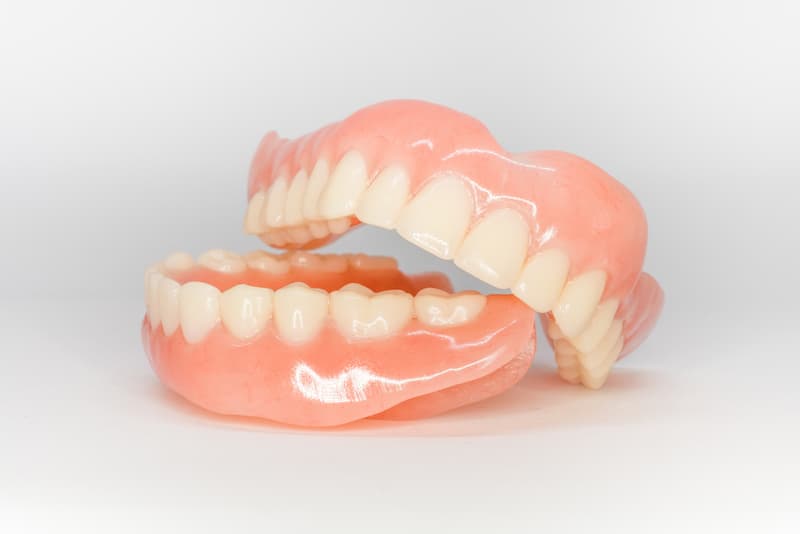5 Things People With Dentures Need to Know
When a patient decides to get dentures, a commitment to denture care and maintenance helps keep the mouth healthy and the dentures in excellent condition for years to come. Once you have overcome the initial learning curve, living with dentures adds to your quality of life by allowing you to get back to speaking and eating with ease comfortably. Learning to care for dentures properly is not complicated as long as you keep a few denture care tips in mind.
1. Make Adjustments to Your Diet
Once your dentures have been adjusted to fit comfortably, most patients need to make some slight adjustments to eating habits to avoid damage. At first, it may be easier to consume foods that are easy to chew or need minimal chewing, such as eggs, vegetables that have been cooked until soft, yogurt, and other naturally soft foods. Foods that are crunchy or tough and require tearing should be avoided, especially as you adjust to your dentures. Tough meats such as steak and chicken can be difficult to tear when wearing dentures. You should also steer clear of hard, crunchy nuts or foods that require a specific type of biting technique, such as corn on the cob.
Instead of biting directly into large pieces of food, it can cut it into smaller pieces before consumption. This way, you can continue to eat various healthy foods while you adjust to your dentures. As you chew, switch the food from one side of the mouth to the other to keep your dentures balanced.
Along with food adjustment, it is also essential to take into consideration your level of hydration. Some denture wearers occasionally experience dry mouth, so paying close attention to how much water you consume can help prevent this issue. Dry mouth can lead to bacterial overgrowth and irritation around the gums.
2. Make Cleanliness a Priority
Replacing natural teeth with dentures does not mean your days of brushing are over. The recommended twice-a-day minimum brushing schedule still applies. Using a soft toothbrush to brush your gums and tongue helps keep bacteria at bay. Your dentures also need to be brushed since they can build up tartar and plaque similar to natural teeth. A soft-bristled toothbrush or a brush developed specifically for denture cleaning can be used, along with warm water and soap.
Keeping your dentures clean reduces the chance of a bacterial or fungal infection to occur. Every day, you should remove your dentures and soak them in water and a cleaning agent specially formulated for dentures. This daily deep clean removes food particles and keeps your dentures looking new and attractive. Ensure all of the cleaning agents are rinsed off thoroughly before placing your dentures back in your mouth to avoid irritation.
3. Give Your Mouth a Break
The best way to avoid gum irritation and discomfort caused by dentures is to give your mouth a break each day. The easiest way to accomplish this is to sleep without your dentures at night. If you have experienced any irritation during the day, resting your gums and soft tissues of the mouth overnight can help you maintain comfort and prevent additional irritation from developing. Be sure to store your dentures safely overnight, typically in warm water, to prevent dryness. If you need to sleep with your dentures for any reason, make an effort to carve out a time during the day that you can take a denture break and give your gums the rest that they need.
4. Practice Makes Perfect
When you first begin wearing dentures, expect an adjustment period during which you may need to change some of your techniques. There are several types of dentures, and each type fits into the mouth differently. Some dentures snap onto implants that have been added to the jaw bone, but most types have explicitly been measured to custom-fit your mouth precisely. Many denture patients choose one of several different adhesives to improve the fit, pastes, powders, glue, or strips.
Once the fit has been perfected, another skill that takes time to learn is speaking clearly. The tongue and muscles surrounding your mouth must adjust to the dentures’ feel and shape, and it can take some time and practice to feel natural. Speak as much as possible, even if it feels uncomfortable or awkward. One recommended technique is spending time each day reading out loud from a newspaper or book.
5. Maintain Regular Dental Visits
After you begin wearing dentures, it is just as important as ever to keep up with your regularly scheduled dental visits. Your dentist will make sure your dentures fit correctly and comfortably and answer any questions you have about maintenance and care. The dentist also checks your gums for signs of damage, disease, or irritation to treat any bacterial or fungal issues you may be experiencing. It is crucial to maintain a strong relationship with your dentist throughout your life since dental diseases can also lead to system-wide problems. It is also important to schedule an appointment with your dentist if you feel your dentures no longer fit as well as they should or if they become cracked or damaged and need repair or replacement.
Learn More About Denture Care
Deciding to wear dentures can be life-changing, and your dentist can help you every step of the way. Before you make the decision, schedule an appointment to speak with a dentist about the process of obtaining dentures and how to maintain them properly. If you are in the Houston, TX area and are considering dentures or have any other dental health needs, contact Ingenious Dentistry to schedule a consultation or ask any questions. You can also reach out to us at (713) 795-5905.
_______
Image Credit: Shutterstock/ trailak amtim




